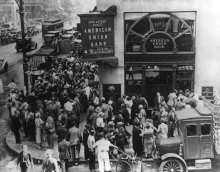Federal Writers' Project – Life Histories/2021/Spring/105/Section 60/John F. Davis
Overview
[edit | edit source]John F. Davis was interviewed by R.V. Waldrep between the dates of 1936-1940. The interview was conducted for the Federal Writers' Project.
Biography
[edit | edit source]John F. Davis was born and raised in Red Bay, Alabama. Very little is mentioned of his early life, other than the fact that he had one sister and was born in the late 1800s. Later in his life, he constructed and maintained a large farm west of Red Bay, Alabama. Davis funded his farm working as a postman during the Great Depression. The farm was known for its large cornfields, sinking valleys, and environmentally friendly features. Davis was well educated despite the difficulties he faced during this period. Waldrep stated that “Mr. Davis talked on with eloquence and passion that you find only in the scholar and the founders of great theories.”1 Living on a farm, Davis became familiar with the wildlife, and he developed a vast knowledge of all types of birds. Davis was very forward thinking and was profusely annoyed by the stubbornness of farmers in the usage of terraces. Davis urged against the use of graded terraces by other farmers and believed that method of terracing was damaging the environment. After conducting numerous experiments, Davis developed a theory of his own, convincing other farmers to leave behind graded terraces. He developed a form of terracing that incorporated an irrigation system, less damaging to the environment. His form of terracing involved “Appropriate management practices needed to reduce soil erosion and maintain soil productivity.”2 After many years of working on his farm, Davis eventually retired, leaving behind his farm, and his legacy.
Social and Political Issues
[edit | edit source]The Great Depression
[edit | edit source]
In the 1920s, a worldwide economic depression hit the world hard and affected millions of individuals' lives. Stock prices fell and markets crashed. As a result, unemployment drastically rose and those who had jobs suffered considerable wage decreases. The lack of jobs available saw the budgets of families reduced, leading to large charitable demands.3 The United States government passed the Smoot-Hawley Tariff, hoping to protect the jobs and industries at risk, but doing so only made things worse. Trade with other countries decreased and the government was at a standstill. The failing economy eventually affected the education of the United States population. Prabhakar believed,"Higher education was beyond anyone’s reach which resulted in contraction of the student bodies in all the universities."4 The election of Franklin D. Roosevelt as president of the United States led to the end of the Great Depression. He passed deals that created jobs, unemployment insurance, and safety guards against another depression.
The Great Farm Depression
[edit | edit source]The Great Depression led to many farmers losing their farms. This period in time would be referred to as "The Great Farm Depression" as a result. Furthermore, over farming and frequent droughts created the Dust Bowl, a natural disaster that ravaged lands and destroyed agricultural produce. The devastation of the Dust Bowl left many farmers without jobs and nowhere to go. Bryan described the situation as being unstable and “Structurally, the demand for rural farming and labor was dropping faster than people were able or willing to move out of the countryside.”5 During this era, the word was becoming more industrialized and many individuals were seeking jobs not involving agriculture. Farmers affected by the Great Depression and the Dust Bowl were not ready to move on from their way of life, as they were financially, culturally, and mentally invested.
Racial Issues in Alabama
[edit | edit source]
The Jim Crow-era was a very difficult time for African Americans in the United States, and specifically those who lived in Alabama. African Americans living in Alabama were the victims of abuse and violence from white police officers, who took advantage of their position. Any form of resistance was dealt with and white police officers cemented their power over them. Inwood recalls that the era was demeaning and “African-Americans often endured illegal searches and seizures, detainment without charge, billy clubs, nightsticks, public humiliation, lewd remarks, loaded guns against their skulls.”6 African Americans were not afforded the same opportunities as white people. The introduction of segregation meant that they were not given the best education,the best medicine, or the best jobs available. The lack of jobs available saw African American families struggle to afford the necessary items to survive, and many families were left with only rations. Tensions only began to heal when The Civil Rights Act of 1964 suspended segregation.
References
[edit | edit source]- Waldrep, "John F. Davis Interview"
- Kagabo, “Effectiveness of terracing techniques for controlling soil erosion by water in Rwanda.
- Basu, “Banking crises and mortality during the Great Depression: evidence from US urban populations, 1929–1937.”
- Prabhakar, "The Great Depression: Social, Psychological, and Cultural Effects."
- Bryan, "The Great (Farm) Depression of the 1920s."
- Inwood, “Making the Legal Visible Wilhelmina Griffin Jones' Experience of Living in Alabama During Segregation”
Bibliography
[edit | edit source]- Fishback P, Meissner C, Stuckler D et al. “Banking crises and mortality during the Great Depression: evidence from US urban populations,1929–1937,” J Epidemiol Community Health, (2012); 66:410-419. https://jech-bmj-com.libproxy.lib.unc.edu/content/66/5/410
- Inwood Joshua. “Making the Legal Visible Wilhelmina Griffin Jones' Experience of Living in Alabama During Segregation,” ProQuest, (May 2005): 54-66. https://search-proquest-com.libproxy.lib.unc.edu/docview/218142898/fulltext/B3FA9FBE66FF4136PQ/1?accountid=14244
- Kagabo Desire et al. “Effectiveness of terracing techniques for controlling soil erosion by water in Rwanda,” Journal of Environmental Management, (January 2021): 111369. https://www-sciencedirect-com.libproxy.lib.unc.edu/science/article/pii/S0301479720312949?via%3Dihub.
- Dan Bryan, “The Great (Farm) Depression of the 1920s.” American History USA, March 6, 2012. https://www.americanhistoryusa.com/great-farm-depression-1920s/.
- Pillai Prabhakar, “The Great Depression: Social, Psychological, and Cultural Effects.” Historyplex, May 16, 2008. https://historyplex.com/effects-of-great-depression.
- Interview, Waldrep on John F. Davis, 1936-1940, Folder 82, in the Federal Writers' Project papers #3709, Southern Historical Collection, The Wilson Library, University of North Carolina at Chapel Hill. https://dc.lib.unc.edu/cdm/singleitem/collection/03709/id/866/rec/1